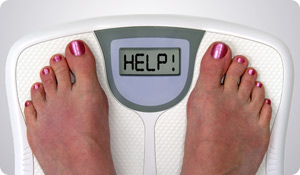
The basic rule of weight loss says that if you take in fewer calories than you use, you'll shed pounds. But sometimes, no matter how hard you try it seems that the scale just won't budge. If you feel that you've been exercising and no results ensue, it may be time to consider whether digestive problems could be getting in the way.
Most doctors recognize a handful of gastrointestinal problems that could interfere with weight loss or cause weight gain. In addition, some medical professionals believe that the way we eat can affect digestive health in ways that prevent weight loss.
Constipation Could Cause Weight Gain
Your physician may diagnosis constipation if you have fewer than three bowel movements per week, but each individual has his or her own rhythm and range of normal according to gastroenterologist Donald Henderson, MD, MPH. Dr. Henderson, Medical Director of Encore Wellness in Los Angeles, California, explains that in cases of severe constipation, your body may be holding five to fifteen extra pounds that won't shed through exercise. Often, constipation can be managed by proper fiber and fluid intake. For continued problems, Dr. Henderson recommends an over-the-counter laxative with polyethylene glycol such as MiraLAX®. If these methods don't ease constipation, your primary doctor can offer additional treatment options.
Beware of Your Own Heartburn Remedies
If you suffer from ulcers, heartburn, or indigestion, yourself-cure might interfere with weight loss efforts. People with these conditions, says Dr. Henderson, "find that they eat because eating itself helps to neutralize acid production." The best approach: be honest about what you're putting into your mouth. "Medicinal" spoonfuls of ice cream used to ease heartburn still count as calories. If you realize that you are eating extra calories to deal with gastrointestinal problems, seek more effective solutions by talking to your doctor.
Consider the Health of Your Liver
Your liver plays a crucial role in digestion. Liver disease can cause digestive problems and lead to weight gain. As Dr Henderson explains, dysfunction of the liver results in fluid retention, which leads to increased weight. To manage liver disease, you may need to modify salt intake and possibly protein intake. "You may also need to receive treatment to handle clots or anything else that might be causing obstructions of flow to the liver," says Dr. Henderson.
Your Eating Habits May Derail You
Beyond physical ailments, it's possible that habits such as eating late at night or eating quickly are disrupting how your body digests food or processes calories.
Though it's not clear why, a 2011 study suggests that if you eat late at night you may be more likely to gain weight than if you ate the same food earlier in the day. Some research, including a 2008 study of 30 healthy women, finds a link between eating too fast and increased calorie consumption. You may not even realize you're consuming more food; thus, your regular exercise plans won't be enough to offset those quickly ingested, unplanned calories.
So before you give up on exercise, look for some basic ways to ensure you're going into a weight loss plan with a healthy digestive system: get a check up from your physician, monitor what and how much you're eating, and be mindful of when and how you're consuming those calories.
Sources:
Baron KG, Reid KJ, Kern AS, Zee PC. "Role of sleep timing in caloric intake and BMI." Obesity 19(7):1374-81 July 2011. Web. October 13, 2011.
Kathleen J. Melanson, Ana M. Andrade, Geoffrey W. Greene. "Eating Slowly Led to Decreases in Energy Intake within Meals in Healthy Women." Journal of the American Dietary Association 108 (7) July 2008. Web. October 13, 2011.
Nafisa K, Kuwajerwala, MD. "Intestinal Motility Disorders." Web. October 13, 2011.





